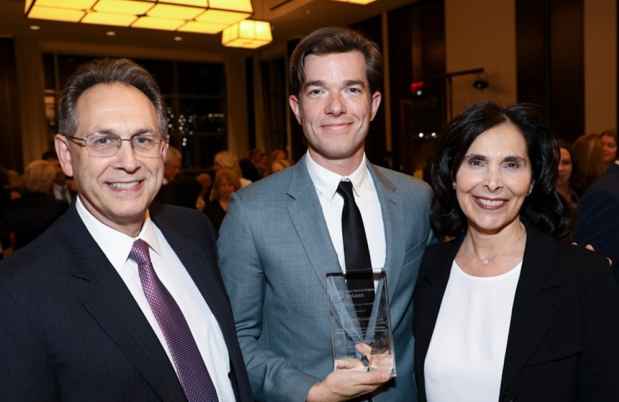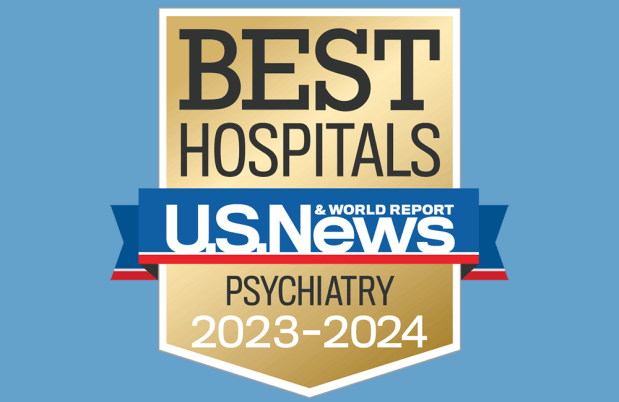On April 21, McLean’s Scott E. Lukas, PhD, received the Stuart T. Hauser, MD, PhD, Mentorship Award in Psychiatry from Harvard Medical School (HMS).
Presented annually, the award is given to an HMS faculty member “for outstanding sustained mentorship of medical students, residents, fellows, and junior faculty in the areas of adult and child psychiatry, human development, and psychosocial research.”
Lukas, an HMS professor of psychiatry who also serves as director of the McLean Imaging Center and McLean’s Behavioral Psychopharmacology Research Laboratory, was recognized for his many years assisting early career researchers and psychiatrists.
“This is a wonderful acknowledgment of Scott’s lifelong contribution to our field through generative mentorship,” said Scott L. Rauch, MD, president and psychiatrist in chief for McLean. “Scott is most deserving of this award, and it is perhaps especially timely with all he has done in terms of fostering National Institutes of Health K awardees, as well as others, through the pandemic.”
“We are deeply grateful for Scott’s leadership and mentorship to so many of us across all levels of career development, and for all he has done and continues to do for McLean,” said Kerry J. Ressler, MD, PhD, McLean’s chief scientific officer.
“It’s a wonderful honor, and I’ll cherish it,” Lukas stated. “But I certainly didn’t set out to win an award for being a mentor—just being able to share in the successes of the people that I’ve helped navigate through their careers is enough.”
The award is particularly meaningful for Lukas because of his professional relationship with the late Stuart Hauser.
Hauser was a professor of psychiatry at HMS and president of the Judge Baker Children’s Center. He was widely known for his work in adolescent development and his focus on resilience to adversity.
Over the years, Lukas and Hauser frequently shared ideas about training and mentorship. The two served together on the HMS Psychiatry Research Committee in the 1990s. Also, Lukas recalled, he borrowed concepts Hauser created for the Clinical Research Training Program at the Judge Baker Children’s Center when he was designing his own NIDA T32 Post-Doctoral Training Program.

Lukas, right, with colleague Dr. Diego Pizzagalli
“When people get awards, you often don’t get to meet the person it’s named after,” he remarked. “So, this award really means a lot to me because of how well I knew Dr. Hauser.”
Lukas recalled that the two would talk about the development and implementation of training and mentoring programs. “I benefited a lot from trading stories with him and from his inside knowledge,” he said. “I remember how charitable he was with everybody around him and how he was always willing to help.”
Like Hauser, Lukas has a reputation for offering his time and insight to help others. Looking back on his career, Lukas said that his mentoring work has been just as important to him as his research work.
“The feeling of being a mentor is right up there with making discoveries. Helping someone work through a challenging situation and then seeing them have a revelation, seeing their eyes light up—there’s nothing like it.” – Dr. Scott Lukas
“The feeling of being a mentor is right up there with making discoveries,” he asserted. “Helping someone work through a challenging situation and then seeing them have a revelation, seeing their eyes light up—there’s nothing like it.”
Lukas described himself as a mentor who is willing to help people find their own ways to learn and grow. “My mentoring style is a little different,” he explained. “I never tell anybody ‘this is what you need to do and don’t come back until you’ve done it.’ I don’t operate like that.” Instead, Lukas said, “I encourage them to collect the facts and see different options. Then, I help them make a decision that feels good to them.”
This approach to mentoring goes beyond the laboratory. “I’ve helped people work through personal issues, family issues, and help them find a better balance between work and home life,” Lukas reported. “I don’t draw a line and tell people they can only talk about science. When I can, I try to help them with more than just their careers.”
On receiving the Hauser award, Lukas expressed gratitude to the colleagues, students, and friends who have supported him during his career.
“This award actually celebrates mentorship for all of us because mentoring is a symbiotic relationship,” he said. “I must thank all of you who have shared your thoughts, ideas, concerns, hypotheses, goals, and visions because I have learned so much from each and every one of you.”
Media Requests
Journalist or member of the media? We are available 24/7 for media requests.



